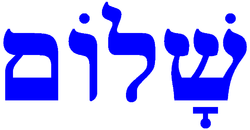How are you? Posted by Sean Young on May 7, 2012 in Grammar, Learning Hebrew
Today’s date: 15th of Iyyar, 5772 – ט״ו באייר תשע״ב
30th day of the Omer – ל׳ בעומר
How Are You?
 So, we just met someone and we greeted them appropriately. Now, we’re going to ask after the person’s health and of their family.
So, we just met someone and we greeted them appropriately. Now, we’re going to ask after the person’s health and of their family.
Remember the all-purpose greeting we used – שָׁלוֹם shah-lom? This word, when literally translated means “peace”, it also means “welfare” (as in your health). So when asking someone how they are doing, you’ll be using a shortened version of this word: שׁלומ-. Although it looks the same as the greeting שָׁלוֹם, it is pronounced shlom (notice the letter mem in shalom has the final, sofit form (ם), but in shlom- is has the regular form – מ).
Why is that? This is what happens to most nouns when a pronominal suffix is added to the word. In Hebrew, pronominal suffixes are possessive and objective pronouns attached to nouns, prepositions, and the definite direct object marker. When appearing on nouns, they are possessive, as in “her locker”. So to ask how someone is doing, you’d say – מַה שְׁלוֹמְךָ? mah shlom-khah? (literally: What is your welfare). The –kha (ךָ) ending here is a pronominal suffix, indicating “your” welfare. If you’d like to ask a female, you’d change the ending slightly – מַה שְׁלוֹמֵךְ? mah shlom-ekh? Let’s break it down to see things a little more clearly:
שָׁלוֹם – shah-lom (hello, peace; welfare).
שׁלומ- – shlom– (the welfare of).
ךָ – –kha (you, your – masculine).
מַה שְׁלוֹמְךָ? – mah shlom-kha? (How are you? / How is your welfare? – to a male).
ֵךְ – –ekh (you, your – feminine).
מַה שְׁלוֹמֵךְ? – mah shlom-ekh? (How are you? / How is your welfare? – to a female).
How is your…?
The pattern מַה שְׁלוֹמ- mah shlom- is also used to ask how others are doing. For example, let’s ask about Mr. Karmi’s wife. The Hebrew word for wife is אִשָּׁה ee-shah – which also means ‘woman’. When adding the pronominal suffix ךָ (-kha), the “-ah” part becomes a tav (ת) as we’ll see here:
אִשֽׁתֵךָ – eesh-teh-kha (your wife – taken from אִשָּׁה i-sha (woman)).
מַה שְׁלוֹם אִשְׁתֵךָ? – mah shlom ish-teh-kha? (How is your wife?).
בַּעַלֵךְ – bah-‘ahl-ekh (your husband).
מַה שְׁלוֹם בַּעַלֵךְ? – mah shlom bah-‘ahl-ekh (How is your husband).
How is the family?
Are you greeting someone who has children, or you want to make a general inquiry about the family? The Hebrew word for ‘family’ is מִשְׁפָּחָה meesh-pah-khah. So let’s add that to our greeting (are you writing this down in your notebook?).
מִשְׁפָּחָה – meesh-pah-khah (family).
הַ- – hah (the) – this is always attached to the noun it belongs to, never a separate word as in English.
מַה שְׁלוֹם הַמִשְׁפָּחָה? – mah shlom hah-meesh-pah-kha? (How is the family?).
I’m (We’re / They’re) fine
If you’re doing well, the typical response is “I’m fine”, “Fine, thanks”, etc. Again, we are going to make use of the word שׁלומ-. This time we use the suffix -ִי –ee (me, my) to make the word שְׁלוֹמִי shlom-ee (my welfare/health). And with the word tov (טוֹב – fine, well) we can then say how we’re feeling:
מַה שְׁלוֹמְךָ?
שְׁלוֹמִי טוֹב
מַה שְׁלוֹמֵךְ?
שְׁלוֹמִי טוֹב
Other Responses
בְּסֵדֶר – beh-seh-der (Okay.)
מַמָּשׁ טוֹב – mah-mahsh tohv. (Really good.)
לא כֹּל כָּךְ טוֹב – loh kohl-kahch tohv (Not so good.)
רַע – rah (bad, not good)
כָּכָה כָּכָה – kah-khah kah-khah (So-so)
Say it like a native
הָלוֹ חָבֵר – ah-lo khah-vehr (Hey! Friend!)
מַה נִשְׁמַע? – mah neesh-mah? (What’s new?)
מְעַט מְאוֹד – meh-aht meh-od (Nothing much)
מַה קּוֹרֶה? – mah koh-reh? (what’s up? what’s new?)
Can You Read This Conversation?
| שלום, משה. מה שלומך? תודה רבה. טוב. ומה שלומך? מה שלומ המשפחה? בסדר. מה שלום אשתך? גם שלומה טוב. |
מֹשֶׁה – moh-sheh (Moses) תּוֹדָה רַבָּה – toh-dah rah-bah (thank you very much) גַּם – gahm (too, also) ַה – –ah (her) שְׁלוֹמַה – shlom-ah (her welfare) |
Answers from Check Yourself “Meeting and Greeting Others“
How would you greet someone at the following times?:
a) 9:00 a.m. (בֹּקֶר טוֹב)
b) 3:30 p.m. (צָהֳרַיִם טוֹבִים)
c) 3:30 p.m. Saturday afternoon (שַׁבַּת שָׁלוֹם – OR – גוּט שַׁבָּת)
d) Sunday night (שָׁבוּעַ טוֹב)
Respond to the following:
a) חֲלוֹמוֹת פָּז – (לַיְלָה טוֹב)
b) שָׁלוֹם – (שָׁלוֹם)
c) יום טוב – (יום טוב)
d) שָׁבוּעַ טוֹב – (שָׁבוּעַ טוֹב)

Build vocabulary, practice pronunciation, and more with Transparent Language Online. Available anytime, anywhere, on any device.
About the Author: Sean Young
Learning languages since 1978 and studying over 50 (achieving fluency in 10). Sean L. Young loves giving tips, advice and the secrets you need to learn a language successfully no matter what language you're learning. Currently studying Hindi and blogging his progress right here at Transparent Language - https://blogs.transparent.com/language-news.



